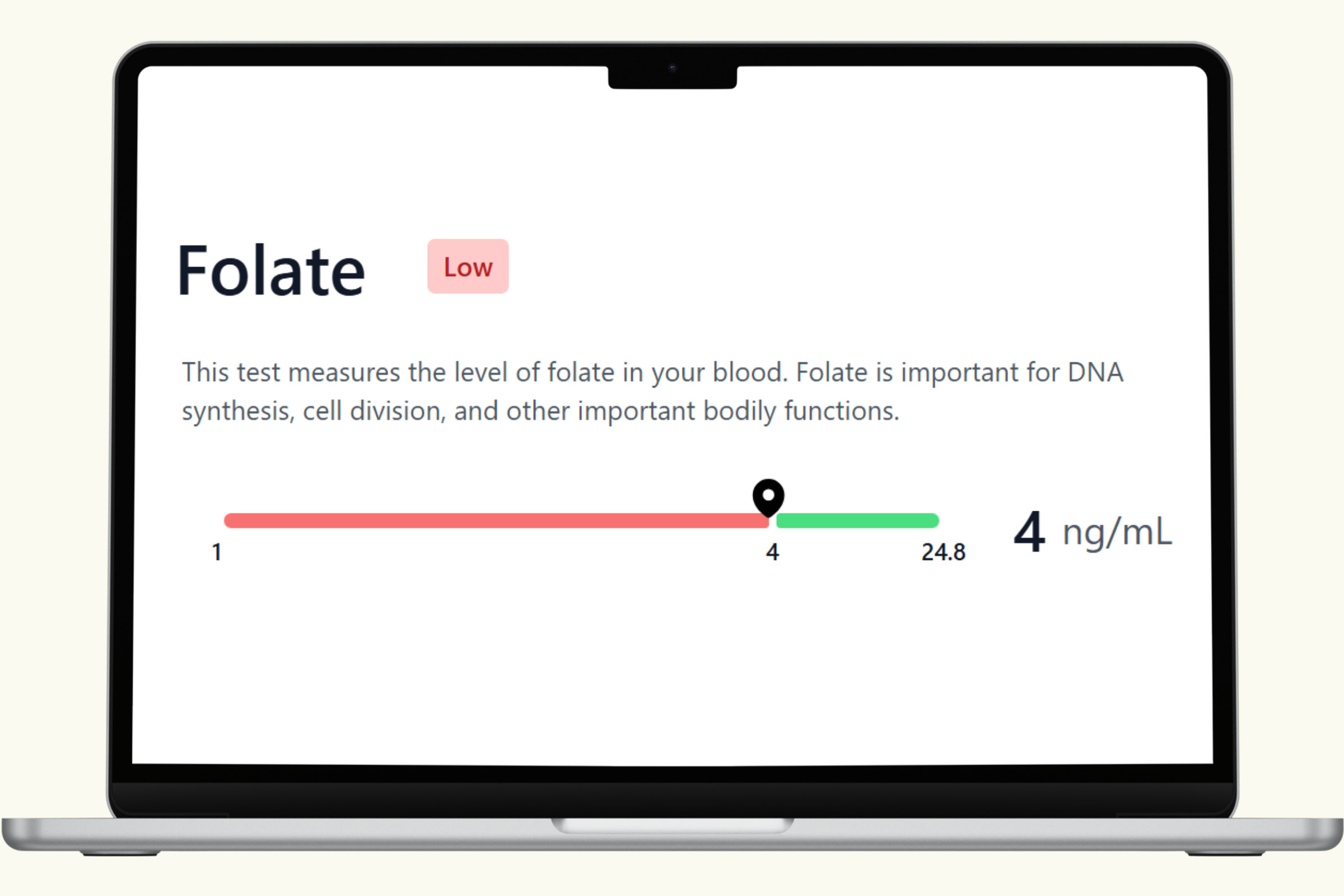Folate Blood Test: Measuring Vitamin B9 for DNA, Methylation, and Overall Health
The Folate Blood Test, included in the PlexusDx Nutrition Deficiency Blood Test, measures levels of vitamin B9 (folate), a water-soluble nutrient essential for DNA synthesis, amino acid metabolism, red blood cell production, nervous system function, and antioxidant defense. Because the human body cannot produce folate on its own, it must be obtained through diet or supplementation. Stored primarily in the liver, folate plays a critical role in growth, repair, and methylation balance. Deficiency is surprisingly common and can have wide-ranging effects on health, making this test an important tool for both prevention and early detection of imbalances.
What Is Folate?
Folate, also known as vitamin B9, is a key nutrient that participates in one-carbon metabolism—a process that drives DNA repair, neurotransmitter balance, and detoxification. Folate works alongside vitamin B12 and vitamin B6 to regulate homocysteine levels, supporting cardiovascular and brain health. In food, folate is naturally present in leafy greens, citrus fruits, beans, and legumes. Synthetic folic acid, the supplemental form, is added to fortified grains and commonly used in prenatal vitamins.
Why Is the Folate Blood Test Important?
Testing folate levels provides critical insights into:
- DNA synthesis and repair – Adequate folate is required for healthy cell division and genetic stability.
- Red blood cell production – Prevents megaloblastic anemia, a condition characterized by large, immature red blood cells that cannot carry oxygen efficiently.
- Methylation balance – Folate donates methyl groups to regulate homocysteine, neurotransmitters, and detoxification pathways.
- Nervous system function – Supports neurotransmitter synthesis for mood, memory, and cognition.
- Pregnancy health – Reduces the risk of neural tube defects and supports proper fetal development.
- Antioxidant defense – Helps protect against oxidative stress and DNA damage.
Folate Blood Test Reference Ranges
Folate levels are typically measured in nanograms per milliliter (ng/mL). Common ranges include:
- Deficient: < 2.0 ng/mL
- Borderline: 2.0 – 4.0 ng/mL
- Sufficient: > 4.0 ng/mL
- Functional/optimal range: 6.0 – 15.0 ng/mL (often considered best for supporting methylation and overall health)
Low folate levels may cause symptoms long before deficiency progresses to anemia, making early testing important for prevention.
Who Is at Higher Risk of Folate Deficiency?
Folate deficiency is more likely in certain groups, including:
- Pregnant women – Increased demand during pregnancy raises the risk of deficiency without supplementation.
- Older adults – Reduced absorption, poor appetite, and medication interactions can lower folate levels.
- People with digestive disorders – Conditions such as celiac disease, Crohn’s disease, or irritable bowel disease impair absorption.
- Individuals with anemia – Folate deficiency is a common cause of megaloblastic anemia.
- Post–weight loss surgery patients – Surgical changes to the digestive tract can limit folate absorption.
- Alcohol users – Alcohol interferes with folate absorption and metabolism.
Signs and Symptoms of Folate Deficiency
Low folate levels can affect multiple systems in the body. Symptoms may include:
- Fatigue and weakness
- Pale skin or anemia
- Irritability or mood changes
- Poor concentration or memory issues
- Digestive upset
- Sore tongue or mouth ulcers
- Developmental complications during pregnancy
Folate, Homocysteine, and Methylation
One of folate’s most important roles is regulating homocysteine, an amino acid that can damage blood vessels when elevated. Folate helps recycle homocysteine into methionine, protecting cardiovascular and brain health. Without enough folate, homocysteine levels may rise, increasing risks of heart disease, stroke, and cognitive decline. This makes folate testing particularly useful when paired with vitamin B12 and homocysteine measurements, as included in the PlexusDx Nutrition Deficiency Blood Test.
How to Improve Folate Levels
If your folate levels are low, simple lifestyle changes can help restore balance:
- Eat folate-rich foods like spinach, kale, asparagus, beans, peas, and citrus fruits.
- Include fortified foods such as cereals and breads enriched with folic acid.
- Consider supplements, particularly for women who are pregnant, planning pregnancy, or breastfeeding.
- Support overall methylation health with complementary nutrients such as vitamin B12 and vitamin B6.
- Limit alcohol consumption, which depletes folate stores.
At-Home Folate Testing with PlexusDx
With the PlexusDx Nutrition Deficiency Blood Test, checking your folate levels is quick and convenient. Using a dried blood spot collection on an ADX card, you can measure folate and other key nutrients without the hassle of visiting a lab. Benefits include:
- Convenience – Collect your sample from home with a simple finger-prick.
- Accuracy – Provides reliable measurement of folate and related biomarkers.
- Actionable results – Helps guide dietary and supplement strategies to optimize your health.
Who Should Consider a Folate Blood Test?
This test is especially valuable for those who:
- Are pregnant or planning to conceive
- Follow diets low in leafy greens or fortified grains
- Have digestive or absorption issues
- Experience fatigue, mood changes, or anemia
- Are older adults concerned about nutrient deficiencies
- Want to monitor methylation and cardiovascular health
Take Charge of Your Nutritional Health with PlexusDx
The Folate Blood Test, part of the PlexusDx Nutrition Deficiency Blood Test, provides critical insight into vitamin B9 status, DNA health, and methylation balance. By detecting deficiencies early, it helps prevent complications such as anemia, developmental concerns in pregnancy, and cardiovascular risks. With at-home collection and fast results, PlexusDx makes it simple to monitor your nutrition and take proactive steps toward better health.
Order your PlexusDx Nutrition Deficiency Blood Test today and ensure your folate levels are optimized for energy, cellular repair, and lifelong wellness.

Share:
Ferritin Blood Test
Hematocrit Blood Test